Digital technology provides the opportunity to enhance pedagogic practice and extend opportunities for individualised learning and students’ self-directed study. Lecturer Geoff Rebbeck has recently explored two technologies that have provided students with, firstly, an efficient strategy for recording their progress and, secondly, a method for peer-to-peer communication that allows students to gain support and share ideas.
PebblePad is an online e-portfolio and personal learning space that allows students to record and evidence their progress; it also provides an effective platform for demonstrating competences and skills for future employment opportunities. WhatsApp is a familiar application for multi-participant communication that provides the opportunity for students to share ideas and support each other’s progress.
Watch Geoff Rebbeck explain the pedagogic benefits of using PebblePad and WhatsApp.
Strategy
PebblePad templates are available to students via the PebblePad section of the university’s VLE. Students simply need to enter Blackboard, click on the PebblePad option within the top menu and then select the allocated e-portfolio template.
Templates can be structured and customised by the tutor prior to student engagement. The production of e-portfolio designs is simple and intuitive – the menus at the top of the page allow the tutor to generate pages and add a range of media content including text, images, videos, embedded applications and a variety of dialogue boxes. The capacity to add dialogue boxes provides the tutor with the opportunity to request a range of learning responses from students, including answers to questions or the submission of ideas and evidence to demonstrate their progress.
The versatility of the PebblePad format gives tutors the option to add a variety of instructions and supportive material, whilst providing students with the opportunity to customise their e-portfolio to suit their individual learning needs.
By adding evidence in the form of ‘assets’, students can demonstrate their skills and competences at any point during their development. In addition to providing requested evidence, PebblePad also has the versatility to allow students to add pages and blogs to their e-portfolios in which to highlight their ideas and progression throughout the duration of their study.
PebblePad provides an accompanying application called ATLAS which records students’ progression throughout their PebblePad learning journey, it also allows tutors to monitor progress and provide feedback to students. PebblePad portfolios can also be shared with others for demonstrating progress, best practice and formative assessment.
WhatsApp is a freely available application on students’ mobile phone devices. Students are encouraged to generate a group WhatsApp account and invite their peers. Once a WhatsApp group has been generated, students can then communicate at any point in time. This has the advantage of allowing students to quickly gain peer-to-peer advice, support and guidance, as well as providing an efficient opportunity for students to collaborate and share ideas.
Benefits
Watch Geoff Rebbeck’s students discuss the benefits of these digital strategies for learning (30 min discussion):
Resources and support
Use the resources below to support the implementation of the above strategies within your own professional practice.
How to use PebblePad
Watch the video below to gain and understanding of how to use PebblePad for generating ePortfolios.
Click here to access the Learning and Teaching Enhancement guide on how to use PebblePad
Click here to watch the Learning and Teaching Enhancement team’s PebblePad instructional video
How to use WhatsApp
Watch the video below to understand how to use WhatsApp on a mobile device.
Watch the video below to understand how to generate a WhatsApp group.
Further support
If you need further support implementing this strategy, or you would like to know more, contact either the Senior Lecturer in Blended Learning, Lee Hazeldine (lee.hazeldine@canterbury.ac.uk), or the Learning Technologist, Sam McFarlane (sam.mcfarlane@canterbury.ac.uk) to arrange a discussion at your convenience.
 PRISM
PRISM Lee Hazeldine
Lee Hazeldine 1532
1532


